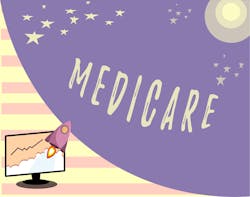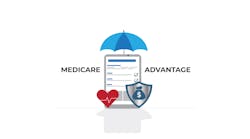In a press release issued by the Centers for Medicare & Medicaid Services late Friday afternoon, CMS released a final rule around documentation that the administration stated should help reduce provider administrative burden.
The press release began, “Today, the Trump Administration and the Centers for Medicare & Medicaid Services (CMS) finalized major policy changes that implement key provisions of President Trump’s Executive Order on Protecting and Improving Medicare for Our Nation’s Seniors that will reduce clinical burden, ensure appropriate payment for clinicians, and enable them to provide their patients with high quality care. This final rule builds on the Trump Administration’s and CMS’s efforts to secure and improve Medicare and establish a patient-driven healthcare system that focuses on improving health outcomes. It is projected to save clinicians 2.3 million hours per year in burden reduction.”
Alex Azar, Secretary of Health and Human Services, said in a statement contained in the press release, that “President Trump has a particular vision for healthcare: a system that’s affordable, patient-centric, and treats you like a person, not a number. CMS is working to deliver that by freeing up clinicians to focus on their patients rather than on paperwork. Historic simplifications to billing requirements mean that clinicians will be able to focus on recording the information that’s most important to keeping a patient healthy. As we move toward a system that pays more and more providers for outcomes rather than procedures, we look forward to freeing clinicians from even more of these burdens.”
The press release went on to say that “The Trump Administration is taking additional steps to address the longstanding criticism from clinicians that billing and coding requirements for Evaluation and Management (E/M) services from the mid-1990s are burdensome and overly complicated. Building on the historic changes finalized last year, these changes update the more than two-decades-old E/M documentation and coding framework that clinicians use to bill Medicare for common office visits. As a result of these updates, starting January 1, 2021, clinicians will be able to make better use of their time and restore the doctor-patient relationship by spending less time on documenting visits and more time on treating their patients. In this final rule, we are also increasing payment for office and outpatient E/M visits as well as providing enhanced payments for certain types of visits, recognizing the value of the clinicians’ time that they spend treating the growing number of patients with greater needs and multiple medical conditions. These changes will also take effect January 1, 2021.
And, said CMS Administrator Seema Verma, in a statement contained in the press release, “Clinician burnout is high because outdated government regulations are diverting their attention from what matters: patient care. The Trump Administration’s final rule brings antiquated requirements, which are over 20 years old, up to date with the current practice of medicine and will impact the current and future generation of clinicians.”
The press release went on to state that “The final rule also helps clinicians take care of patients who are chronically ill. Right now, Medicare pays for care management services for patients transitioning from the hospital, or for patients with multiple chronic conditions. CMS is introducing a new Principal Care Management (PCM) code that separately pays for care management of patients with single, high-risk chronic condition such as diabetes or high blood pressure, ensuring that patients with one high risk condition can receive important care management services such as checking medication adherence and coordinating care. Payments to practitioners will increase for the transitional care they provide as patients move from the hospital to follow-up care, which is important for patients because it ensures the continuity of their care. Improvements will also be made to chronic care management services for patients with multiple chronic conditions. In addition to the existing payments for chronic care management services, practitioners can be paid more if they spend more time on these care management services. Patients with chronic care needs who use the healthcare system more frequently benefit from this additional care coordination.”
The press release went on, “In addition, the final rule improves the Quality Payment Program by streamlining requirements with the goal of reducing clinician burden by including a new, simple way for clinicians to participate in CMS’s pay-for-performance program, the Merit-based Incentive Payment System (MIPS). This new framework, the MIPS Value Pathways (MVPs), will be developed in collaboration with stakeholders such as medical professional societies and will begin in the 2021 performance period. It moves MIPS from its current state, which requires clinicians to report on many measures and activities across the multiple performance categories, which consist of Quality, Cost, Promoting Interoperability, and Improvement Activities, to a program that allows clinicians to pick which clinically-related, specialty-specific measurement sets to report on that are more relevant to their scope of practice.”
And, it added, “Under this framework, patients will be able to compare clinician performance on these measures, as well as on a standard set of claims-based population measures (readmissions, for example) and interoperability measures. In this way, clinicians will be held accountable for fewer but more meaningful measures. As directed by the Executive Order to enable providers to spend more time with patients, we are making changes on Medicare physician supervision requirements of physician assistants (PAs) to give PAs greater flexibility to practice more broadly in the current health care system in accordance with state law and state scope of practice. Currently, Medicare requires that PAs provide services under the general supervision of a physician, meaning that the services are furnished under a physician’s general direction and control. In this final rule, we are revising this supervision requirement to instead defer to state law and scope of practice requirements to determine the level of supervision required, allowing PAs to practice at the top of their professional training and increasing access to care for beneficiaries.”
According to the fact sheet associated with the final rule:
“Consistent with our goal to reduce burden, we are aligning our E/M coding with changes adopted by the American Medical Association (AMA) Current Procedural Terminology (CPT) Editorial Panel for office/outpatient E/M visits. The CPT coding changes retain 5 levels of coding for established patients, reduce the number of levels to 4 for office/outpatient E/M visits for new patients, and revise the code definitions. The CPT code changes also revise the times and medical decision making process for all of the codes, and requires performance of history and exam only as medically appropriate. The CPT code changes also allow clinicians to choose the E/M visit level based on either medical decision making or time.
We are adopting the AMA Specialty Society Relative Value Scale Update Committee (RUC) recommended values for the office/outpatient E/M visit codes for CY 2021 and the new add-on CPT code for prolonged service time. The AMA RUC-recommended values will increase payment for office/outpatient E/M visits. The RUC recommendations reflect a robust survey approach by the AMA, including surveying more than 50 specialty types, and demonstrating that office/outpatient E/M visits are generally more complex and require additional resources for most clinicians.
We are also strengthening the Medicare-specific payment for office/outpatient E/M visits for primary care and non-procedural specialty care that we finalized in the CY 2019 PFS final rule. We have simplified this payment by using a single add-on code describing the work associated with visits that are part of ongoing, comprehensive primary care and/or visits that are part of ongoing care related to a patient’s single, serious, or complex chronic condition. This will be implemented in CY 2021.
We are not adopting changes to the global surgery codes, as we continue to evaluate data.”
Further, according to the fact sheet:
“To reduce burden, we are finalizing broad modifications to the documentation policy so that physicians, physician assistants, and advanced practice registered nurses (APRNs – nurse practitioners, clinical nurse specialists, certified nurse-midwives and certified registered nurse anesthetists) can review and verify (sign and date), rather than re-documenting, notes made in the medical record by other physicians, residents, medical, physician assistant, and APRN students, nurses, or other members of the medical team.”
In addition, in the care management area, the fact sheet notes that:
“For CY 2020, we are finalizing our proposal to increasing payment for transitional care management (TCM) services which are care management services provided to beneficiaries after discharge from an inpatient stay or certain outpatient stays.
We are creating a Medicare-specific code for additional time spent beyond the initial 20 minutes allowed in the current coding for chronic care management (CCM) services, which are services provided to beneficiaries with multiple chronic conditions over a calendar month.
Recognizing that clinicians across all specialties manage the care of beneficiaries with chronic conditions, we are also creating new coding for principal care management (PCM) services, for patients with only a single serious and high-risk chronic condition.”
Separately, among other elements in the final rule, CMS is adding new codes connected to telehealth services, to allow for a bundled episode of care for the treatment of opioid use disorders.


